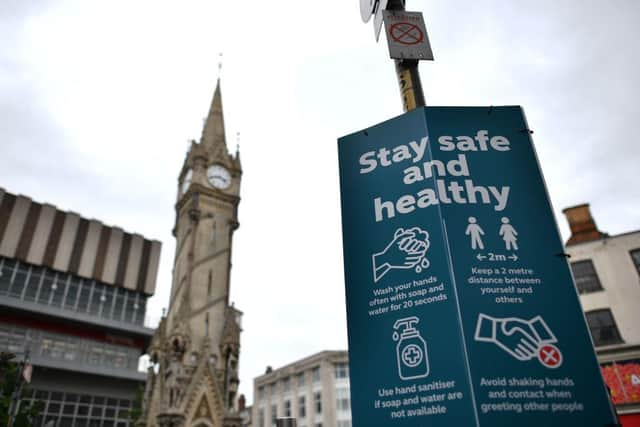Leicester lockdown: what restrictions are in place as PHE finds coronavirus infections driven by under 19s and working age people
and live on Freeview channel 276
Tougher lockdown restrictions have been enforced in Leicester following a spike in coronavirus cases.
The strict measures mean the city will not emerge from parts of lockdown as quickly as the rest of England, with the Prime Minister warning similar measures could be extended in other towns and cities over the coming months.
Why is Leicester in lockdown?


Advertisement
Hide AdAdvertisement
Hide AdLeicester has been forced into a harsher lockdown than the rest of the UK due to a recent outbreak of infections, accounting for 10 per cent of all coronavirus cases in the country over the past week.
Health Secretary Matt Hancock said the city’s seven day infection rate was 135 cases per 100,000, amounting to three times that of the next highest city.
These are the areas that have been included in the lockdown:
- Blaby District – Braunstone Town (including Fosse Park), Glenfield, Glen Parva, Leicester Forest East (East of the M1), Thorpe Astley
- Charnwood – Birstall, Thurmaston
- All areas of Oadby and Wigston
What measures will be imposed?
Advertisement
Hide AdAdvertisement
Hide AdTo prevent further spread of the virus, all non-essential shops have been closed and schools closed to pupils on 2 July.
Schools will only stay open for vulnerable pupils and children of key workers, and people will be permitted to travel for childcare.
All but essential travel to, from and within the city is being discouraged and residents have been told to stay at home wherever possible.
Extra facilities have also been set up for walk-in tests, while home testing kits are available.
Advertisement
Hide AdAdvertisement
Hide AdLeicester City Council said there had been more than 940 confirmed cases of coronavirus in the city in the past two weeks, and that an indoor testing centre would open on Tuesday (30 June) at the Highfields Community Centre, with further testing sites planned.
Mr Hancock has said that anyone who experiences symptoms of coronavirus must come forward for a test.
The lockdown measures will be kept under review and it will be decided if any restrictions can be lifted in two weeks’ time.
What caused the oubreak?
PHE has said that the rapid increase of coronavirus cases in Leicester could have been driven by community transmission, rather than a specific outbreak, such as in a care home, or hospital setting.
Advertisement
Hide AdAdvertisement
Hide AdHowever, the PHE report did identify an increase in the number of people aged under 19 who had been infection, rising from five per cent of all cases in mid-May to 15 per cent in June. A similar increase in infections was also found among working age people.
While no "analytical link" between the reopening of schools to more pupils in June and the increased infection rate, was found, PHE said that further investigation would be "sensible".
How do local lockdowns work?
Mr Hancock explained that where there are localised “flare-ups”, restrictions or lockdowns could be used in those specific areas in England to contain the virus spread.
He said that the Joint Biosecurity Centre, which advised the government on the Covid alert level, would work in partnership with local directors of public health and NHS teams to address the issue of a local outbreak, and ensure the right action was taken.
Advertisement
Hide AdAdvertisement
Hide AdHowever, depending on the severity of the outbreak, a local lockdown may focus solely on the location where it occurred, such as a care home, or workplace, or it would extend to a wider area.
If the latter is imposed, lockdown could extend to a postcode, town or a whole city, if it was considered necessary. However, local councils do not currently have the power to enforce a lockdown on a whole area, such as a town or city.